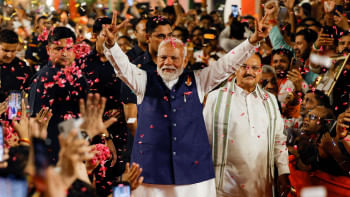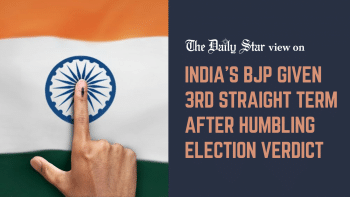Column by Mahfuz Anam: The majesty of ‘public will’

On Sunday, Narendra Modi will commence his third consecutive term as India's prime minister, a first after Jawaharlal Nehru, India's founding prime minister. The Indian people have chosen their leaders and representatives in parliament, and we congratulate them for it. This election marks the return of coalition government in India that had been the norm before BJP's single-party domination ended it in 2014. This will be the first time that BJP, having failed to obtain enough seats on its own—getting 240 while needing 272—will have to depend on its alliance partners to form a coalition government with Nitish Kumar of Bihar and Chandrababu Naidu of Andhra Pradesh. As reported in Indian media—and not unexpected in the tradition of coalition politics in the subcontinent—the two are already trying to extract the maximum price possible for their crucial backing, without which Modi cannot form his new government. The bargain is, of course, focused on crucial ministries and the position of the speaker for the Telugu Desam Party, according to The Telegraph.
The verdict of India's election greatly tempered Modi's shine and energised the opposition. A message doing the rounds on WhatsApp, as quoted by journalist Swapan Dasgupta in the aforementioned paper, goes, "The Indian voter has given a verdict that will be remembered for a long time. They have given the BJP and allies a victory that feels like a defeat. They have given the INDI [sic] alliance a defeat that feels like a victory."
By all accounts, Modi's victory is very impressive. BJP won 240 seats on its own, which is more than the combined seats won by the opposition and more than double that of Congress's tally of 99. Why, then, should a tinge of defeat be associated with it? Because it overplayed its success, and the slogan that BJP would win more than 400 seats in the House of 543 itself exhibited an arrogance and overconfidence that has made its success look like a defeat—a case of shooting oneself in the foot.
When democracy is on the slide in many countries, and election as an event is suffering from many distortions, especially instigated by the ruling party (don't we know it?), for India's election to have come through with credibility and overall acceptance is an achievement that must be praised and celebrated by democracy-loving people everywhere. Around 969 million people, 70 percent of a population of 1.4 billion, were eligible to vote. According to figures from the Election Commission of India, 642 million voters voted, of whom 312 million were women, making for the highest participation by women voters in the country's history.
Though victorious, the ruling coalition NDA has been dealt a body blow that has surprised most election watchers both inside and outside India. Though Narendra Modi as the tallest leader in India and the BJP as the largest single party have retained their strong positions, the resurgence of the opposition and, within it, that of Congress—the grand old party that many pundits had written off—are signs of the emergence of functioning democracy that can only bode well for India and its neighbours.

What we consider to be the most noteworthy aspect of India's election is the rebirth of the opposition. In fact, it can be termed a "rebirth" of a parliament long overwhelmed by a single-party dominance, and without a viable opposition, the House really loses its functionality. In a parliamentary form of government, the House acts as the centre of all national politics. It is where national issues are debated, the government made answerable, polices judged, and resource allocation scrutinised in depth. It is the parliament where a government, however powerful, is made aware that people are its "master."
The gradual erosion of the central role of parliament, which we have witnessed in Bangladesh, was also evident in India with the dominance of BJP. With 232 seats in the House—the central institution that holds sway over the functioning of India's governance structure—the role of the opposition is likely to see an effective revival. The importance of this particular fact cannot be overestimated. The most important outcome will be to ensure greater accountability of the government in running its affairs. Each bill will be far more scrutinised, and all megaprojects and expensive initiatives will be delved deeper into. In a House with a strong opposition, each individual MP will feel far more empowered to question the government and the administration as a whole—especially the bureaucrats, whose mindset is far from serving the people.
Reviving the effective role of the opposition in monitoring and holding the government accountable is of great significance for us in Bangladesh, as we have almost forgotten that the parliament is really where public representatives are supreme. In our case, the overwhelming presence and almost monopoly control of the House by one party has literally obliterated the powerful role of the House, the role of the speaker, and of individual MPs.
Along with the all-India elections, the one in West Bengal also has special significance for us in Bangladesh. The popular expectation that BJP would fare better than the last time and might even get more seats than before was proven wrong. Mamata Banerjee, due to her political acumen, election strategy, and campaigning energy, must be congratulated for the way she single-handedly held back the Hindutva tide to return her own candidates in the election.
A significant takeaway from the results of the Indian election is that religion-based election campaigning has its serious limits. Voters in a country where democracy has been practised since 1947 have the wisdom to see the damaging impact of such campaigns and the courage to set a corrective course in motion.
For us, a nation constantly badgered by endless controversies surrounding every poll of any sort, the Indian election is a matter of envy as no one as yet has raised any objection about the election process or the outcome. The results of each phase—and there were seven in total—were stored by the Election Commission of India and made public after 44 days when the whole process was completed. The whole election was conducted through EVMs that provided a paper trail to reinforce voters' confidence in the machines. For us, EVMs remain a far cry as public confidence, instead of rising, has dwindled further during the last election.
As we congratulate India's new leadership, we celebrate the victory of democracy in our giant neighbour, with whom we have forged partnership for our mutual benefits. It was the might of the verdict of the Indian voters that resonated throughout the world, the region and also, hopefully, within Bangladesh where our own voters aspire for the same power. It proved that a mature voter can see through the superficiality of populism, the danger of divisive politics, the pitfalls of using religion to gain votes, and the price that people end up paying when hate and othering becomes instruments of gaining support. In some fundamental ways, the Indian voters saw the tragedy of opting for creating deep wounds that have the possibility of festering into long-term, if not permanent, fault lines. India's election proved once again that, if allowed free expression, public will always strengthens democracy. Conversely, if not allowed, it destroys democracy from within.
Mahfuz Anam is the editor and publisher of The Daily Star.
Follow The Daily Star Opinion on Facebook for the latest opinions, commentaries and analyses by experts and professionals. To contribute your article or letter to The Daily Star Opinion, see our guidelines for submission.

 For all latest news, follow The Daily Star's Google News channel.
For all latest news, follow The Daily Star's Google News channel. 











Comments